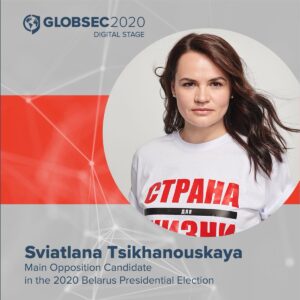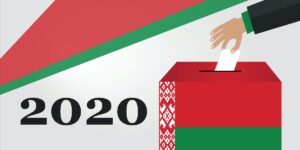![]() Belarusian authorities detained opposition leader Maria Kolesnikova today while she attempted to enter Ukraine, according to state media. Ukraine and opposition activists disputed this version of events, saying Kolesnikova was trying to prevent her forced expulsion from Belarus, the BBC reports (HT:CFR).
Belarusian authorities detained opposition leader Maria Kolesnikova today while she attempted to enter Ukraine, according to state media. Ukraine and opposition activists disputed this version of events, saying Kolesnikova was trying to prevent her forced expulsion from Belarus, the BBC reports (HT:CFR).
The Kremlin invaded and occupied territory in Georgia and Ukraine to prevent those countries from moving geopolitically westward, according to Michael Carpenter, Managing Director of the Penn Biden Center for Diplomacy and Global Engagement, and Vlad Kobets, Executive Director and Co-Founder of iSANS, the International Strategic Action Network for Security.

Globsec
But in doing so, the Kremlin’s neoimperialists planted deep roots of resistance to Russian occupation and intensified popular support for Euro-Atlantic integration—especially among younger Georgians and Ukrainians. Belatedly, Moscow is learning that no amount of disinformation can reverse these trends, they write for Foreign Affairs:
For this reason, Putin has a different plan in mind for Belarus. Instead of deploying “little green men” to occupy Belarusian territory, Moscow is aiming for something we have called “soft annexation.” The strategy is to “boil the frog” gradually, starting with economic integration and a common currency, followed by political integration through a common foreign and defense policy, and culminating in a full-fledged Union State that would mean the de facto absorption of Belarus into Russia.
The Kremlin framed Poland as a leader in sponsoring Belarusian protests for the first time and Belarus claimed the ongoing protests are part of a Western-sponsored “color revolution.[…]The Kremlin may be setting information conditions to conduct hybrid operations against Poland, George Barros writes for the Institute For The Study Of War (HT; FDD).

FPRI
Western democracies should offer vigorous support for Belarus’s national civic awakening, Carpenter and Kobets add:
Today’s protest movement has given birth to a new consciousness that both mobilizes and unites Belarusians. Much like the Polish Solidarity movement that was born 40 years ago in the shipyards of Gdańsk, this consciousness stitches together blue-collar workers and intelligentsia, urban and rural communities—even, in today’s Belarus, IT-savvy youngsters and babushkas. Remarkably, the movement has also drawn in some members of the ruling nomenklatura. RTWT







